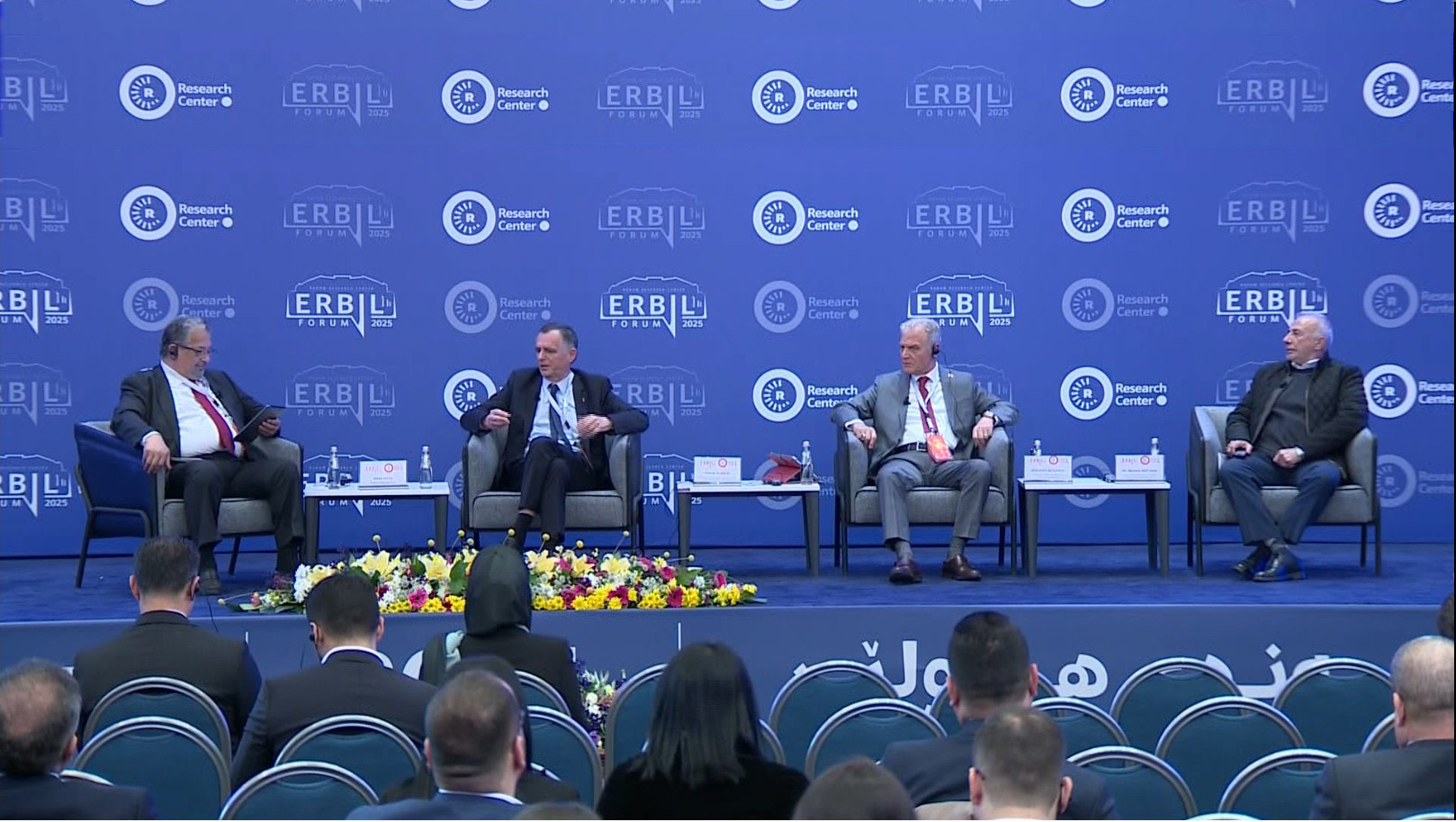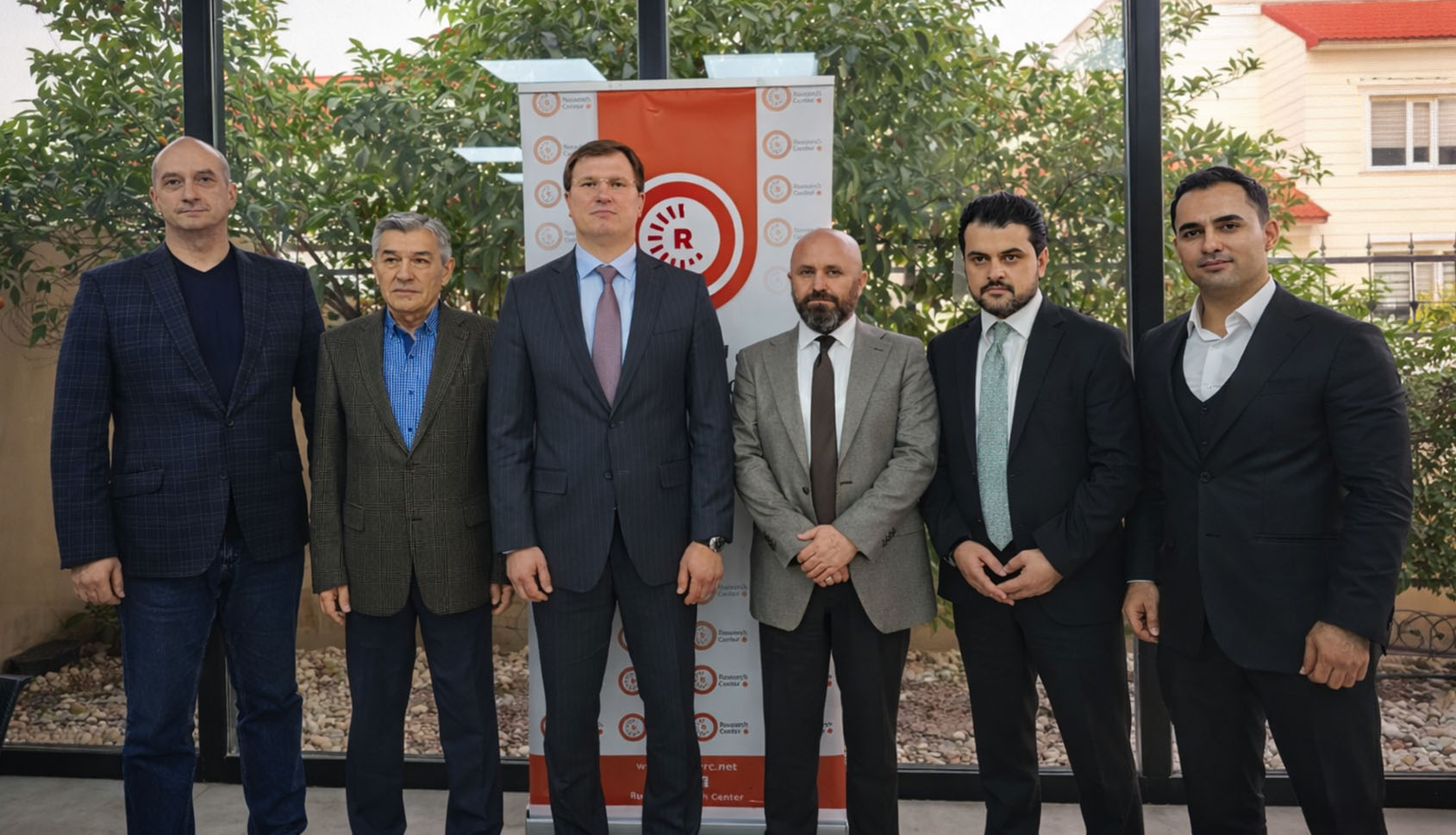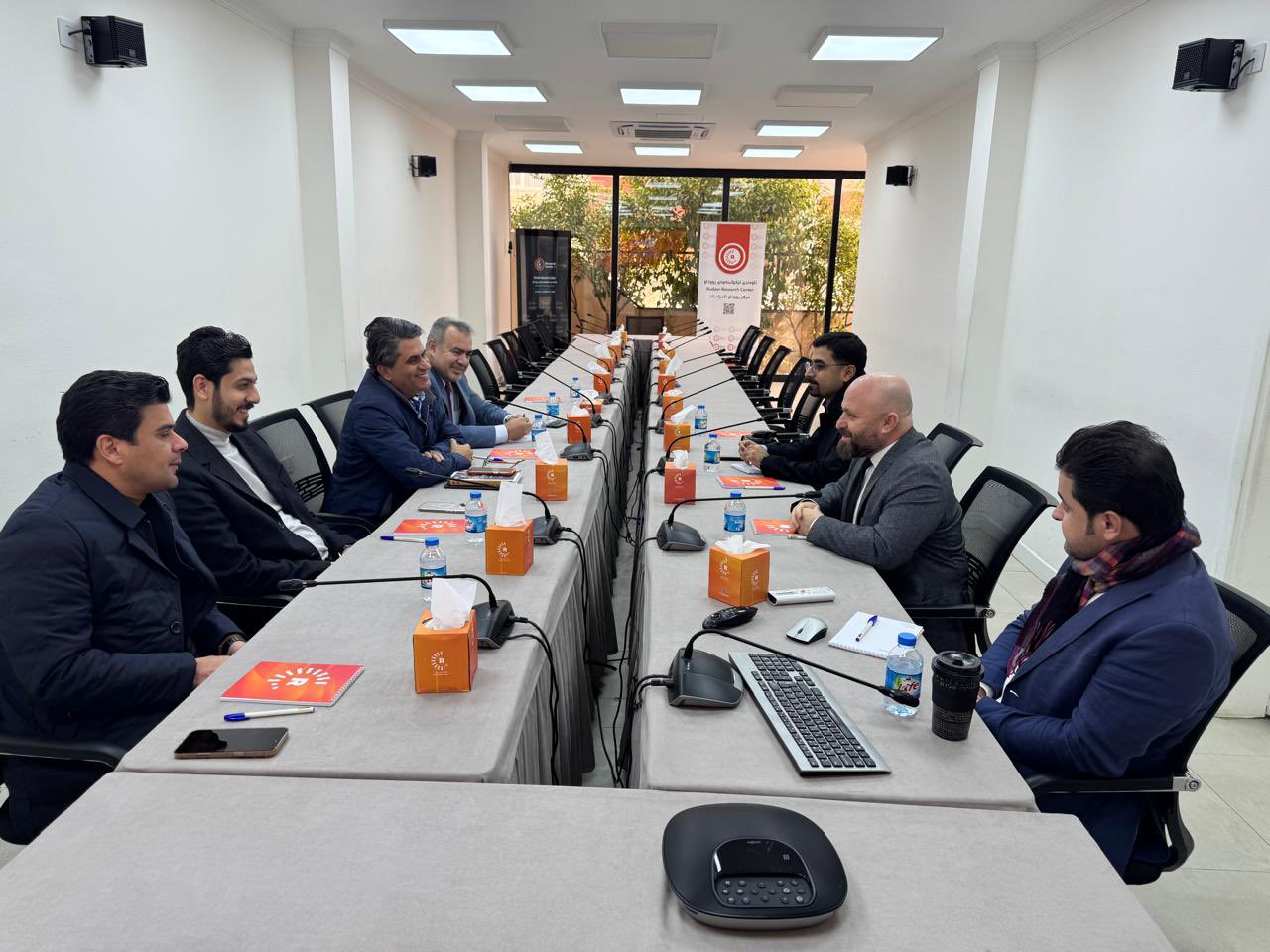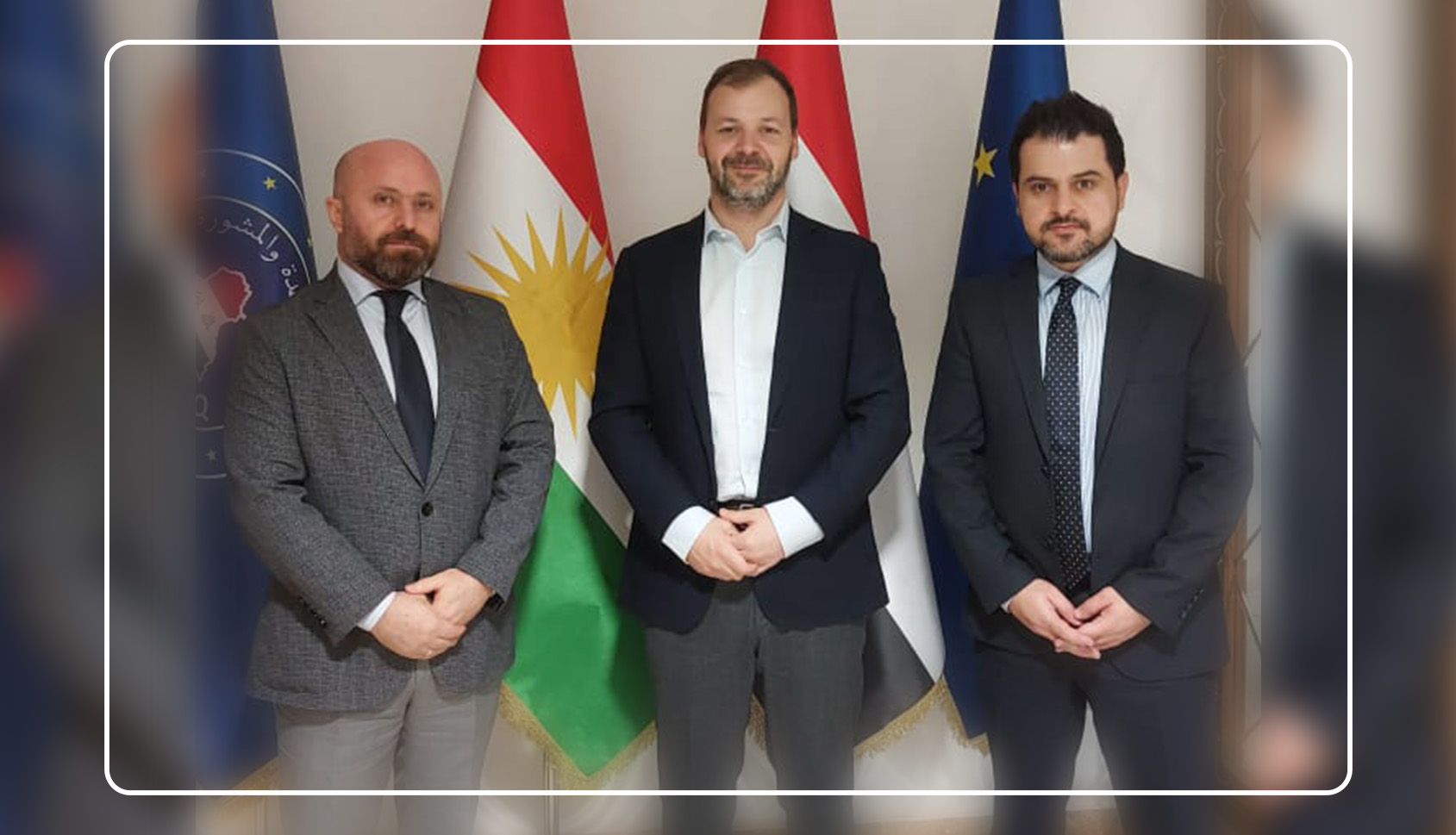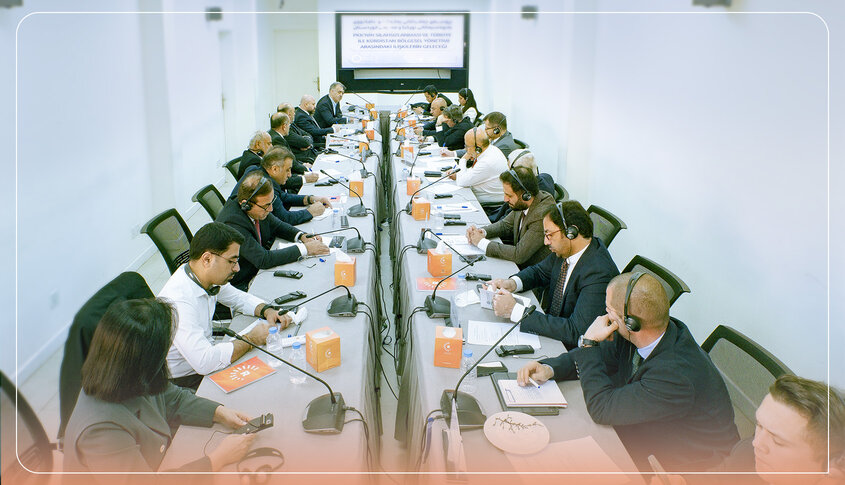Panel 03: The Political Future, Military and Security Balances in the Middle East: Persistent Conflict and Tensions or Sustainable Stability?
09-04-2025
Maad Fayad:
The panel is titled "The Future of Security, Military and Security Balances in the Middle East: Continued War and Tensions or Balance and Stability?" Our esteemed guests today are Mr. Pascal Ausseur, Retired Admiral of the French Navy and Director General of the Mediterranean Center for Strategic Studies; Mr. Muzaffer Akyıldırım, Retired Turkish Diplomat and Military Officer; and Dr. Ibrahim Mottaghi, Professor of Political Science at the University of Tehran and an Expert on Regional Security.
Before we begin, I would like to point out that this region has not experienced stability since World War II. In Europe, after the war, there was a period of recovery and stabilization. However, the Middle East has never had that same level of stability. There have been wars, assassinations, occupations, and conspiracies. While the Kurdistan Region has not been particularly stable, and even now has only relative stability, the situation in the rest of the region remains unstable.
I would like to ask Mr. Pascal: What is France's strategic military and political vision in the Middle East?
Pascal Ausseur:
Thank you for this question. First of all, I would like to clarify that I am not here as an official representative of France. I served for 40 years in the French Armed Forces, but I am now entirely a think-tanker and speak solely on my own behalf. That is the first point.
The second point is that the Middle East is not on the moon—it is part of the world we all share. We are currently witnessing a historical rupture. For nearly two centuries, the global trend was one of convergence toward the European model. However, today, the world is diverging in multiple directions. This represents a fundamental shift in the global order. While the economy remains important, it holds less significance than before. In contrast, states are becoming increasingly dominant.
Ten to fifteen years ago, the prevailing belief was that states were losing their influence while the economy, NGOs, industries, and corporations were gaining power. Today, the opposite is true—states have regained importance. Nationalism is on the rise across the globe, making identity issues a central concern. This is evident in Europe, and it is also a reality in the Middle East. Power struggles and geopolitical considerations are becoming more prominent, signaling a shift in the global paradigm.
Although certain aspects of today's world resemble the 19th century, we must recognize that we are now living in an era with a global population of 8 billion people, interconnected through technology, trade, and communication. There is a unique blend of 19th-century power dynamics and 21st-century interdependencies.
This transformation affects how France, Europe, and the world perceive the Middle East. The new global rules are reshaping the influence of great powers. The United States now faces internal challenges in rebuilding a cohesive nation-state. It is increasingly focused on Asia, less engaged with Europe, and likely less involved in the Middle East. Additionally, the U.S. is paying more attention to its immediate sphere of influence as it contends with rising global competitors.
Russia, on the other hand, is primarily focused on reclaiming its former Soviet sphere of influence in Europe, the South Caucasus, and Central Asia, meaning it may reduce its attention to the Middle East. Meanwhile, China prioritizes its interests in Asia and prefers to avoid direct involvement in the geopolitical and security affairs of the region.
As a result, there is now less competition among great powers in the Middle East, creating space for medium-sized regional powers to play a more prominent role. In my assessment, the key players in this evolving landscape are countries with strong nation-state foundations. Four countries in the region possess the stability and institutional strength necessary to engage in power politics: Turkey, Israel, Iran, and Saudi Arabia.
A decade ago, Saudi Arabia would not have been considered a regional power, but today, due to its strengthened nation-state framework, it has emerged as a significant player. Surrounding these four dominant states, there are many more fragile nations that have not yet resolved their nation-state challenges. These include Lebanon, Syria, Iraq, and Jordan—where the situation is increasingly precarious—Yemen, and, further afield, Sudan.
From my perspective, not speaking on behalf of the French authorities but as someone analyzing from France, the crucial issue is that a regional power struggle will unfold among these four major players. The risk is that weaker states in the region may suffer as a consequence of these power dynamics. Issues of volatility, security, and sovereignty are now more critical in the Middle East than they were in previous years.
To briefly summarize how France and Europe might approach this situation, I would say that European nations, including France, are facing their own internal challenges. They must adapt to the shifting global order, as the European Union has been caught off guard by these changes. The EU’s strategy was largely post-national, post-historical, and centered on economic integration. Now, it must adjust to the new geopolitical landscape. As a result, Europe will likely adopt a more cautious approach, engaging in fine-tuned diplomacy to maintain stability, safeguard security, and preserve sovereignty while supporting economic development.
I would say that France will try to manage the situation, avoiding escalation in the competition between the four key regional powers. They will try to avoid any escalation because tensions between Israel, Iran, Turkey, and Saudi Arabia would be a nightmare for France.
Now, regarding the development of these countries in the region, particularly Iran and Turkey, could you please clarify again? Sorry, I missed that part. Could you translate it once more?
Clearly, Iran and Turkey share a long history of strategic dominance in this region, with the Ottoman Empire playing a significant role in this history. When listening to President Erdogan’s speeches, his frequent references to the Ottoman Empire are strikingly evident. Both countries have strong economic, demographic, political, and military ties. Turkey has engaged in frequent military operations in Iraq. Additionally, the connections between Turkish Kurds, Iraqi Kurds, Syrian Kurds, and Iranian Kurds are substantial, as mentioned earlier in the panel. Thus, it is clear that both Iran and Turkey have significant interests in being involved in the region’s dynamics.
Furthermore, the "Resistance Axis" led by Iran plays a major role in the region—something you are likely more familiar with than I am. As the U.S. becomes less involved, the European Union shifts its focus, and Russia turns its attention inward while gaining strength, there will be more opportunities for Iran and Turkey to assert themselves.
I expect my colleagues will elaborate on this point further, but there will certainly be opportunities for Iran and Turkey to take a more prominent role in managing regional stability and development. Both countries have their own ideas about how to achieve this. From my perspective, as a former military officer, it is clear that there is a significant risk of confrontation, competition, and possibly direct conflict between these four powers.
Saudi Arabia and Israel, the other two countries involved, do not have the same historical imperial legacies as Iran and Turkey, but they certainly have their own strategies and influence in the region. We all know they each have well-defined strategies in place. Thus, there is a real risk of escalation between these four powers.
The main issue for these four countries, as well as for other regional players, is how to manage the situation and address the strong security risks now present in the region. Paradoxically, while the U.S. has caused much trouble in this region, its military presence—had it not made mistakes—could have helped to calm tensions. However, the U.S. will not be present in the near future. The critical question, then, will be how these four regional powers, along with other countries, manage to avoid escalation and prevent a dramatic situation from unfolding.
Maad Fayad: Turks, Arabs, Persians, and Kurds are the largest nations in the region. What is the Kurdish position in Turkey's policy and strategy?
Muzaffer Akyıldırım: Thank you, Mr. Moderator. I began speaking in Turkish because I understand that many in the audience speak Turkish, or at least understand some of it. I greatly appreciate the floor.
As requested—though very late and at the last moment—I have prepared a presentation to help you visualize Turkey’s perspective on the Middle East and its broader policy. I hope that you will both hear me clearly and see the presentation slides, as I believe they will help you remember and reflect on the discussion.
Before I introduce myself properly, allow me to say that I am a former military officer, having served 19 years in the Turkish Armed Forces, and I spent 25 years in the Turkish Ministry of Foreign Affairs (MFA). My work within the MFA was primarily focused on NATO and EU issues, and I was posted to Brussels three times. However, I requested to be assigned to regions outside of Europe to better understand what is happening in other parts of the world, such as the Middle East and Central Asia, which we refer to as Turkestan. As a result, I was deployed to Afghanistan, marking the second phase of my diplomatic career. My final posting was in Kazakhstan, where I served as the Consul General.
As you can see on the slides, there are two specific emblems next to my name. On the right, you’ll see GFI, which stands for the Geopolitical Foresight Institute, a think tank in Turkey that we recently established. On the left is BDU, the Businessmen and Diplomats Union, organized in Istanbul. They invited me to join their consultative committee. I am speaking on my own behalf today, not representing the government, but with 25 years of experience in the Ministry of Foreign Affairs and 19 years of service in the Turkish Armed Forces.
Now, when it comes to Turkey’s perspective on Middle Eastern security issues, I’d like to remind you of a statement by Bernard Lewis in his book on the Middle East: “Those who are unwilling to confront the past can neither understand the present nor the future.” This statement resonates deeply when we consider Turkey’s history, starting from the Ottoman era and even earlier, from Central Asia through the Seljuk Empire and other Turkish states. The last of these empires led to our independence, which was achieved through a great war in the 1920s under the leadership of Mustafa Kemal Atatürk. Now, the Republic of Turkey is more than 100 years old, and we have over a century of experience in the region as a democratic, parliamentary-based state with multi-directional relationships with Europe, the East, South, and North.
To help you understand the context of where I’m coming from, you can see on the slide a brief history of the Turkish people’s origins. I won’t go into too much detail, but from Tuğrul Bey to Salah ad-Din Ayyubi, from Muzafferiddin Gökberi—whose tomb is in Erbil (a place you may be familiar with)—to Süleyman Shah, whose tomb is near the Syrian border, and not to mention the Ottoman sultans, including Sultan Murad, who was in Baghdad, and Sultan Yavuz Selim, who was in Cairo, Egypt, we have had long-standing, brotherly connections with this region, both mentally and emotionally.
Now, let’s turn to the current situation. As my colleagues have mentioned, we are living in a geopolitical phase of reinventing geopolitics. In the past, Ibn Khaldun said, “Geography is destiny.” Today, I define it as “Geography is geopolitics.” You won’t read in high school that geography is simply about rivers, mountains, and what you produce. It’s about what you hold and what you can benefit from within your borders, based on your geographic location.
Therefore, we are discussing geopolitical issues rooted in the definitions of geopolitics, from Mahan to Mackinder. I won’t go into those details, but the map on my slide shows that the Middle East, and especially its core—Turkey—provides crucial insight into how all major trade routes, energy supplies, infrastructure, and transportation pass through this region. All major wars in the region have been fought over energy, transportation, trade, and access to markets—fundamental needs for any key global actor. Turkey, as part of this history, has been involved since the beginning.
The slide also displays five different emblems of international organizations that surround us: NATO, in which I worked for more than 10 years; the EU, where I worked for 4 years; the Organization of Turkish States, where I was deployed to Afghanistan and Kazakhstan for over 6 years; and BRICS, the fifth organization, which is focused on developing better partnerships for economic growth, not just for itself but for the Middle East. Believe it or not, Turkey’s development is directly linked to the region’s development. In future slides, you will see that if we invest and develop together, we will all succeed together.
Next slide, please. Let me quickly finish. I know, I know, but geopolitics is so deep. I was asked to provide the Turkish military perspectives for the region, so I’m diving into that. I’ll go through it quickly, and the last slides are important for your questions. Please bear with me.
Okay, let’s move a little faster. Here are some delicate facts about the Middle East. You can read them on the slide, but I will highlight a few key points. This region has been the center of civilization, not only for this region but for the entire world. It is the birthplace of many different issues, including ethnic, religious, and linguistic diversity. There have been historical rivalries, wars, and human tragedies, but also miraculous events that took place here. Energy resources and strategic importance have been of utmost value for centuries.
Next slide, please.
Maad Fayad: You still haven’t answered my question. Just a moment. You haven’t answered my questions yet.
Muzaffer Akyildirim: The transitions and challenges that the region is facing today are depicted in this slide. I will highlight just one key issue: settlement and cohabitation. These are fundamental issues for every country in this region.
Next slide, please. What is Turkey’s role in the current geopolitical environment? Again, I will give you very specific highlights, not read everything, and will focus only on the key points. For us to develop this region, we need two things: first, leadership; second, the involvement of all actors and nations around us. We need to ensure that we stay on track with the right ideas, objectives, and solutions.
Next slide, please. What has Turkey recently provided in terms of regional and global initiatives, involvement, and interaction? You can see it on the slide. Let me just highlight one key point: global balance and global stance are critical. As all participants today, from high-level officials to the current panelists, I believe we all agree that we must cooperate for solidarity and develop multi-vectored collaborations. The rest is on the slide, and this is the key issue: making sure we use the timing correctly. Okay, next slide, please. I believe this is interesting.
Maad Fayad: Sir, please answer my question. Thank you. This is not a lecture.
Muzaffer Akyildirim:
Yes, I know. Thank you. Just two more slides. I understand we are short on time. Please look at this slide. What you see in the green ellipse or circle is the core of the world, and we are in the Middle East.
Next slide, please. I will skip this part, but let me just say that we must develop cooperation in security and defense, working together and winning together. The vital importance of security and defense aligns with the geopolitical, geoeconomic, and geostrategic synergies.
Now, coming to the last part: What opportunities do we have to tackle both old and new challenges? We have a historic opportunity to renew ties and shape the future. We must leave behind the "wait-and-see" approach and establish more consultative relationships among us. We shouldn’t allow the region to become a migration center or a breeding ground for extremism and terrorism. Cooperation on humanitarian efforts, reconstruction, and economic stability are key issues. A long-term perspective is needed to recover and implement a two-state vision in the region, especially for Palestine.
Next slide, please. My last slide will focus on what we, as a collective, should commit to. We must focus on our work and finalize our homework. This is Turkey's general perspective, but these are my words, not the official government’s. We should invest in and contribute to regional development projects, such as the Development Road in Iraq. We should work to improve local life, city infrastructure, and employment by developing projects like the Development Road Initiative. We must address the root causes of mass migration and terrorism, prevent further turmoil, and stop the destruction of societies. We must advocate for the territorial integrity and sovereignty of states in general, without discrimination. We must lead common stances against the displacement of communities. Whoever lives in the region should remain there.
Finally, we must eliminate extremism and terrorism to improve the social and cultural fabric of our societies.
Maad Fayad:
Dr. Ibrahim, how do you interpret Iran's influence in the region? Do you think you are forced to play a role in this influence because of Western interference in the region?
Dr. Ibrahim Mottaghi:
Yes, in the name of Allah, the Almighty and the Merciful. This is a very subtle question, and I will try to adapt my discussion to yours. But first, I must explain to my friends that I am very happy to be in Erbil. This is a place where I feel a kinship. A sign of this kinship was the presence of Nechirvan Barzani this morning. The language that Barzani used was partly based on the Kurdish spirit and partly on the Iranian spirit. The Iranian spirit shows signs of pragmatism. Pragmatism means coupling strategic and geopolitical objectives with power relations. The fact is that during the Iraq-Iran War, there were signs of a new geopolitical thinking emerging for Iran.
During the war, France, Britain, Germany, and the United States provided comprehensive support to Iraq. The balance of power shifted completely. Iran found itself in a geopolitical vacuum. Any country in a vacuum will naturally reproduce its own policies for the future. Iran was a country that was, to some extent, organizing itself in an atmosphere of war even after the revolutionary years. However, it faced a crisis. When the war ended, Iraq still held territory that Iran considered its own. So, what was Iran's most important concern?
Iran's most important priority has been to ensure its security. This is the real concern of any country—survival cannot be achieved without security. Another important point is that sanctions continued after the war. The U.S. policy toward Iran was one of containment. This was the same policy the United States adopted towards the Soviet Union. The interesting point here is that, according to the U.S. policy of containment, American allies, namely European countries, supported the United States. Iran was in a position where it could not form alliances. Turkey, a NATO member, France, a NATO member, and Germany, where the ambassador is present here, are all members of NATO. Their security is collective, and the atmosphere is one of wartime outlook.
In the post-war era, Iran aimed to create security and build its security infrastructure. So, what should Iran do in this situation?
In the atmosphere of siege, Iran had no choice but to "help itself." What did Iran do to help itself? It took the initiative. Iran's initiative had a synergistic effect with its surrounding environment. When the major powers restrict an actor's natural space of action, and that actor has experienced a war in which all major powers, with the support of the United States and the Soviet Union, backed Iraq—specifically Saddam Hussein—then Iran had no choice but to turn to its own resources. Iran was forced to shift its alliances and build its security by extending its efforts to the surrounding arena. What appears in Iranian literature as the "front of resistance" is, in fact, a kind of logical policy for security and survival.
Maad Fayad:
What do you mean by "second countries"?
Dr. Ibrahim Mottaghi:
My point is very clear. I am not a diplomat who speaks vaguely, like the ambassador’s wife or our deputy foreign minister. I am a teacher. I am also involved in media work. Naturally, when you cannot interact with the powers that be, they will place you in a position of control and restriction. Such a thing should be done. Regional actors tend to follow the interactions of powerful countries. In that context, when you have experience with war and wish to stay involved, you must build alliances to survive. So where does Iran view alliances? It sees the resistance front, the sub-national region, and, if necessary, the super-national region for survival. Be aware that you must either enhance the capabilities of the nation-state, or, conversely, include the sub-national region and surrounding environment in your agenda.
In a state of force, Iran put regional defense on its agenda. But what was the defense for? Iran's defense was not about creating new geopolitics or pursuing a policy of force. Iran’s defense was focused on coalition-building. Consider the space of Iraqi Kurdistan: defense, according to Michel Foucault, is a field for the interaction of peripheral actors. Iraqi Kurdistan was an ally to Iran during the war, and since 1991, the Shiites have been Iran's allies. This alliance extended to surrounding areas. The Palestinian issue, as mentioned by our diplomat and colleague, is a case in point. The Palestinian state only holds meaning within the balance of power, which is why Palestinians turned to Iran. Many argue that Iranian politics are ideological, but many Palestinian Marxists have also been allies of Iran.
What the Western world calls the "Shiite Crescent" is, in my view, better understood as a defensive crescent and bow. Therefore, when a country is threatened, it is compelled to advance the balance of power in the surrounding region. But by 2025, the balance of power has shifted. The regional balance has also changed. Iran could have played a balancing role in 2023, but today, it cannot. Turkey, on the other hand, can now play that role. A clear example of this is the role Turkey has played in its relations with Syria, Lebanon, and Israel. Therefore, in the current context, in terms of the balance of power, it is Turkey that can take on the role of a regional balancer.
Iran's role remains influential but not strategic. This strategic role has shifted to Turkey as of 2024. In my opinion, Turkey will develop a policy of force on one hand while facing greater challenges on the other due to the nature of this role in the future. The question is whether the distribution of power will be democratic or whether it will follow a pyramidal structure. Why did the German ambassador to Iraq refer to a discussion and state that they have not yet decided? Syria is not the main issue. The primary issue is Turkey. The real question is: What direction will Turkey take in the regional environment?
Iran undeniably played a role in the Syrian situation in 2024, adopting a pragmatic policy. Had Iran not taken this pragmatic approach, I am certain there would have been a bloody war in Syria. One of the main reasons the conflict ended in eleven days was Iran’s decision, after consulting with Turkey, Russia, and Bashar al-Assad, to refrain from using military force and to continue within a diplomatic framework.
Maad Fayad: Dr. Mottaghi, within the framework of what you described as security policy, Iran was the first country to open a consulate in Erbil, the capital of the Kurdistan Region, and the first country to launch a missile attack on Erbil that killed civilians. How do you assess Iran's relationship with the Kurdistan Region? Is it a stable and complete relationship?
Dr. Ibrahim Mottaghi: Is there sound? What I have to say is that, naturally, Iran’s behavior has been to support actors who played a role in the resistance front. Iran's defense identity is a historical one. If you look at Iran's history, you will see that Iran has always been at the center of supporting actors who wanted Iran to play a supporting role, in any way. The future of Iran’s relations, both in the regional space and domestically, in my opinion, will be more democratic, more cooperative, and will move towards multilateral participation.
Maad Fayad: Is the missile attack on Erbil part of the policy of supporting democracy and the region?
Dr. Ibrahim Mottaghi: Look, generally speaking, in some cases, countries misjudge the circumstances. I am an academic, and I have a strategic approach. If you ask me for advice, I will say frankly that Erbil or other parts of the region should never be in a state of aggression. When we maintain warm relations with the state, and with the Kurdistan Region, most problems can be resolved diplomatically. But don’t forget this—sometimes military parties choose pragmatic tactics; as a teacher, I cannot support such actions. Why? Because there are alternative ways. The military should be the last resort; the worst tool to use when solving problems.
Maad Fayad: The Kurds have shown great bravery and made many sacrifices to fight terrorism (al-Qaeda, ISIS, and others), whether in the Kurdistan Region or in the West and the Kurdish areas. What does this mean for France strategically?
Pascal Ausseur:
First of all, I believe that what my colleagues have said very well illustrates the future involvement of regional powers in the Middle East. These powers will be much more present because they feel that their security is at stake beyond their borders. They will act outside their borders, as I have already indicated. My analysis is that regional powers will have more freedom to act in the future than they did in the past. That’s my main point.
From France’s perspective, I believe the primary concern for both France and other European countries is that instability in this region will be harmful to everyone—bad for the countries involved, bad for the region, and ultimately bad for Europe and France. Instability leads to a flow of people fleeing their countries, economic problems, energy issues, and many other complications. As we already have a significant number of people from the Middle East in Europe, integrating the tensions within our societies has become an important issue. This is particularly relevant in Europe, where we now have Kurds, Arabs, Jewish people, Turks, and others. The Middle Eastern population is now an integral part of European societies.
So, what would a Frenchman advise in order to stabilize and develop this region? As I mentioned earlier, in this new world, where economics is no longer the sole driving force and geopolitics has returned to the forefront, the notion of the nation-state is crucial. One of the challenges Iraq, Syria, and Lebanon face—Lebanon being a perfect example—is that they are not fully functioning nation-states. These countries are not clearly defined as nation-states, which weakens them and leaves them vulnerable to power struggles between neighboring countries.
Therefore, my suggestion would be to work towards developing a sense of unity in Iraq. Lebanon's situation is dire; when you see how Lebanon has drifted away from being a cohesive state, it is troubling. I don’t even know if Lebanon can still be considered a nation-state, and I don’t believe it can. It will be very difficult for Lebanon to survive as a state, a nation, or even a country.
For a large country like Iraq, it would be a nightmare to face a situation similar to Lebanon’s. My point is that efforts should be made progressively, as was suggested earlier by the Minister-President, the Prime Minister, and the President of the Assembly, to foster a spirit of unity. This unity is necessary for these countries to effectively confront the policies and strategies of their neighbors.
Maad Fayad:
Thank you so much to all of you, dear distinguished panelists. We will conclude our panel here, as we are out of time. Thank you once again.

